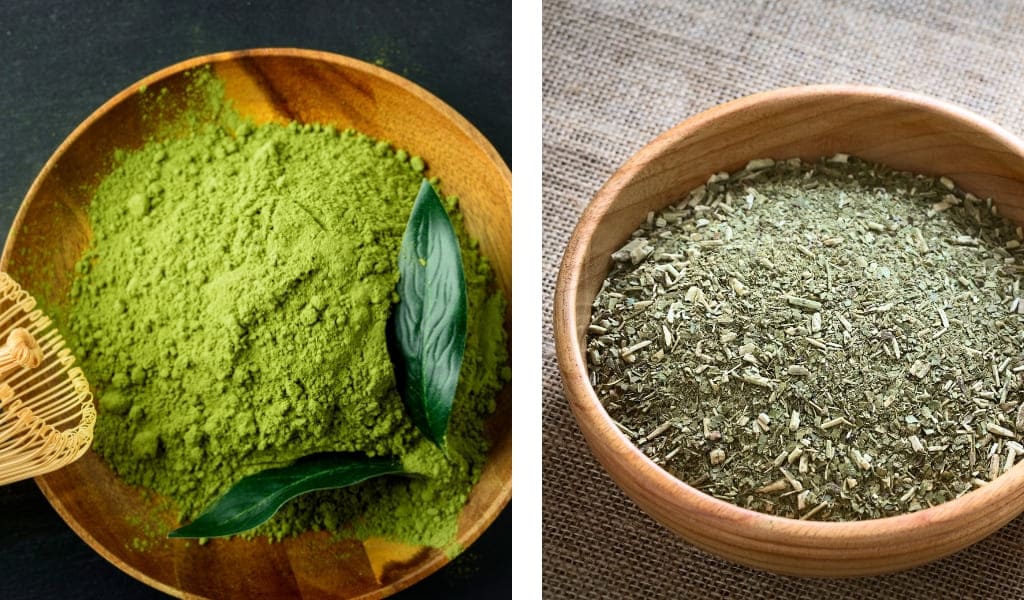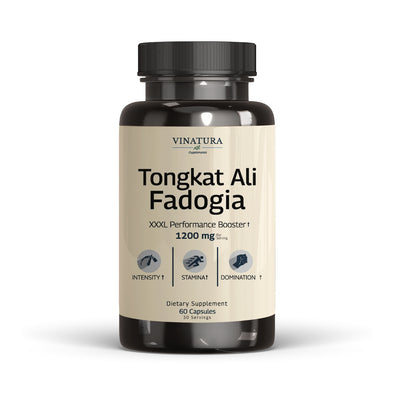
Yerba Mate Vs Matcha: Is Matcha The Same As Yerba Mate?
Is Matcha the same as Yerba Mate? This article will illuminate the distinct qualities, flavors, and cultural significance of Yerba Mate vs Matcha, helping you discover which suits your preferences and lifestyle. Whether you're a tea enthusiast or seeking a new beverage experience, this comparison aims to provide insight into the rich traditions and health benefits associated with Yerba Mate and Matcha.
Before exploring further, please read the disclaimer located at the end of this webpage.
Is Matcha The Same As Yerba Mate?
No, the answer is negative. Matcha, a powdered green tea from Japan, contrasts with Yerba Mate, a traditional South American beverage made from the leaves of the Yerba Mate plant.
Although both Matcha and Yerba Mate are widely popular, they differ in taste, preparation, and cultural significance. Let's explore further in the next section to gain a deeper understanding.

Key Benefits of Yerba Mate
Yerba Mate is a herb with deep roots in South America, known as a traditional beverage celebrated for its countless health benefits, notably:
Enhanced Mental Focus [1]: Yerba Mate is renowned for its cognitive benefits, providing a natural boost to mental focus. The combination of its active compounds promotes increased alertness and concentration.
Elevated Energy Levels [1]: Yerba Mate offers a sustained energy boost with its natural caffeine content without the jitters often associated with other caffeinated beverages. This makes it a preferred choice for those seeking a balanced and enduring energy lift.
Improved Physical Performance [1]: Athletes and fitness enthusiasts appreciate Yerba Mate's potential to enhance physical performance. Infusing nutrients in Yerba Mate improves stamina and endurance during physical activities.
Support for Weight Loss [1]: Yerba Mate has been associated with aiding weight loss efforts. Its natural compounds may help boost metabolism and reduce appetite, making it a valuable addition to a balanced diet and active lifestyle.
Anti-Inflammatory and Immunostimulating Properties [1]: Beyond its stimulating effects, Yerba Mate contains anti-inflammatory and immunostimulating compounds. These characteristics may contribute to bolstering the immune system and promoting overall well-being.
Key Benefits of Matcha

Matcha is rich in catechins, powerful antioxidants that combat oxidative stress for overall health [2] [3] [4].
Boosts Metabolism: The catechins in Matcha may increase metabolism, aiding in calorie burning and weight management.
Enhances Relaxation and Mental Clarity: L-theanine in Matcha promotes relaxation without the jittery effects, providing mental clarity.
Natural Detoxifier: Matcha's chlorophyll content supports natural detoxification, eliminating toxins from the body.
Improves Skin Health: Antioxidants in Matcha combat free radicals, contributing to healthy and youthful skin.
Supports Cardiovascular Health: Regular Matcha consumption may improve heart health and lower blood pressure and cholesterol.
Promotes Concentration: Combining L-theanine and caffeine in Matcha enhances alertness, concentration, and cognitive function.
Yerba Mate vs Matcha: The Comparison
Yerba Mate vs Matcha: The Similarities
Both Matcha and Yerba Mate are abundant in antioxidants, which contribute to overall health promotion. Thanks to their caffeine content, Yerba Mate and Matcha offer a natural energy boost.
Both drinks' caffeine and other compounds contribute to enhanced mental focus, offering various health benefits such as metabolic support and cardiovascular health.
Despite these similarities, each beverage possesses distinct flavors, cultural significance, and specific health attributes, making them unique and highly valued in their ways.
Yerba Mate vs Matcha: The Differences
In the quest to explore the differences further, let's delve into a comparative analysis of Matcha and Yerba Mate. The following table distills their unique characteristics, cultural significance, and health attributes side by side.
|
Yerba Mate |
Matcha |
|
|
Origin |
Derived from the leaves of the Yerba Mate plant, native to South America. |
Made from shade-grown tea leaves of the Camellia sinensis plant, primarily cultivated in Japan. |
|
Flavor |
Has a robust, earthy flavor with herbal undertones. |
Offers a vibrant, grassy taste with a creamy texture. |
|
Caffeine |
Contains caffeine but is often considered to provide a more balanced and gradual energy boost compared to other caffeinated beverages. |
Contains caffeine as well, complemented by L-theanine, resulting in a unique, focused energy without the jitters. |
|
Preparation |
Traditionally brewed by steeping dried leaves in hot water. Often consumed from a hollowed-out gourd with a metal straw (bombilla). |
Prepared by whisking powdered tea with hot water, creating a frothy, bright green beverage. |
|
Cultural Significance |
Holds cultural importance in South American countries, often consumed communally and associated with social bonding. |
Integral to Japanese tea ceremonies, representing a connection between aesthetics, preparation, and mindfulness |
|
Color |
Typically has a brownish-green color. |
Known for its vibrant green hue. |
|
Nutritional Composition |
Rich in antioxidants, vitamins, and minerals. |
Abundant in catechins, chlorophyll, and amino acids, offering a unique nutritional profile. |
Comparison table of Matcha vs Yerba Mate
Yerba Mate vs Matcha: What Should You Choose?
Flavor preferences: If you enjoy robust and intense flavors, Yerba Mate may be more to your liking. Matcha might be the perfect fit for you if you prefer vibrant and grassy flavors.
Cultural connection: Consider each beverage's cultural significance and whether you resonate more with South American traditions or Japanese tea ceremonies.
Health goals: Evaluate your health objectives, such as seeking balanced energy, and choose Yerba Mate. Consider Matcha if you're specifically looking for antioxidants or unique nutritional benefits.
Ultimately, both Yerba Mate and Matcha offer distinct experiences, so it's worth exploring both to determine which aligns better with your preferences and lifestyle.
Can You Combine Yerba Mate And Matcha?
You can combine Matcha and Yerba Mate if you're feeling adventurous and want to enjoy the benefits of both beverages. This Matcha Yerba Mate blend can create a unique blend of flavors and provide a well-rounded set of nutrients. Here are a few ways you can combine Yerba Mate and Matcha:
Matcha Yerba Mate Blend Latte:
- Brew Yerba Mate and Matcha separately.
- Mix both, add milk, and enjoy a latte.
Mate-Matcha Smoothie:
- Brew Yerba Mate and Matcha.
- Blend with fruits or yogurt for a smoothie.
Iced Mate-Matcha Tea:
- Brew Yerba Mate and Matcha separately.
- Mix, cool, and pour over ice for a refreshing tea.
Mate-Matcha Shot:
- Brew concentrated Yerba Mate and Matcha.
- Combine for a powerful shot.
Conclusion
In conclusion, exploring Yerba Mate vs Matcha reveals a rich tapestry of flavors, cultural significance, and health benefits. While both beverages share similarities in antioxidants and energy-boosting properties, their unique characteristics make them distinctly appealing. Embrace the distinctiveness of each, and if you're feeling adventurous, the fusion of Yerba Mate and Matcha offers a delightful blend for a truly unique beverage experience.
References
- [1] Lutomski, P., Goździewska, M., & Florek-Łuszczki, M. (2020). Health properties of Yerba Mate. Annals of Agricultural and Environmental Medicine. https://doi.org/10.26444/aaem/119994
- [2] Willems, M. E. T., Şahin, M. A., & Cook, M. D. (2018). Matcha Green Tea Drinks Enhance Fat Oxidation During Brisk Walking in Females. International Journal of Sport Nutrition and Exercise Metabolism, 28(5), 536–541. https://doi.org/10.1123/ijsnem.2017-0237
- [3] Dietz, C., & Dekker, M. (2017). Effect of Green Tea Phytochemicals on Mood and Cognition. Current Pharmaceutical Design, 23(19), 2876–2905. https://doi.org/10.2174/1381612823666170105151800
- [4] Kochman, J., Jakubczyk, K., Antoniewicz, J., Mruk, H., & Janda, K. (2020). Health Benefits and Chemical Composition of Matcha Green Tea: A Review. Molecules, 26(1), 85. https://doi.org/10.3390/molecules26010085
Author

Product Disclaimer
The dietary supplement products mentioned on this website are formulated based on scientific research and adhere to FDA guidelines for dietary supplements. However, the content of the articles has not been evaluated by the Food and Drug Administration (FDA) and is not intended to promote or endorse any specific product. Any products sold on this website are not intended to diagnose, treat, cure, or prevent any disease.
Opinions and Endorsements
Any claims, statements, or opinions expressed in the articles are those of the author(s) and do not necessarily reflect the views or opinions of the manufacturers of the dietary supplement products. The products sold on this website are separate from the content of the articles and are not directly endorsed or associated with the information presented here.
Liability Disclaimer
The author(s) of the articles, website, and manufacturers of the dietary supplement products do not assume any liability for any potential consequences arising from the use of the information provided in the articles. It is recommended that individuals consult with a qualified healthcare professional before making any dietary or lifestyle changes, including the use of dietary supplements.
Product Usage
Please refer to the product labels and packaging for specific usage instructions and guidelines for the dietary supplement products sold on this website.
Customer Support
For any concerns or questions regarding the dietary supplement products, please contact our customer support team, who will be more than happy to assist you.





Leave a Comment
Be the first to comment.
What do you think?